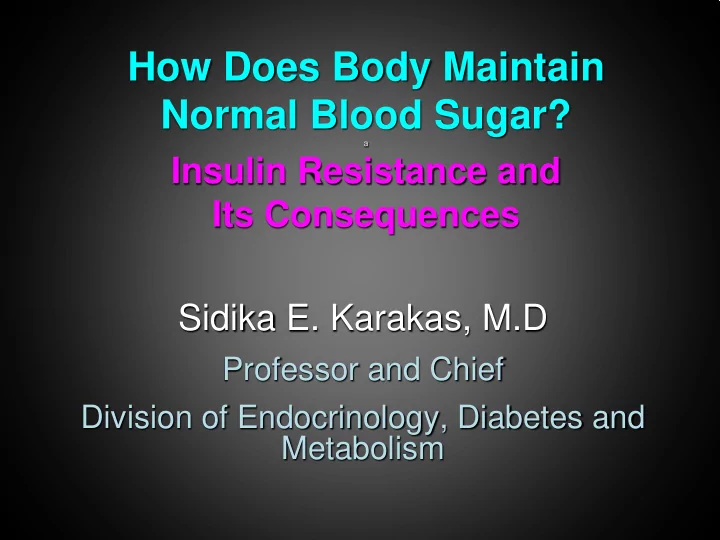

How Does Body Maintain Normal Blood Sugar? a Insulin Resistance and Its Consequences Sidika E. Karakas, M.D Professor and Chief Division of Endocrinology, Diabetes and Metabolism
Symptoms of High Sugar Symptoms of Low Sugar (Diabetes) (Hypoglycemia)
Blood Sugar Homeostasis
Pancreas
Amount of Insulin We Need Depends on What We Eat Meals containing sugars and simple carbohydrates require more insulin
Amount of Insulin We Need also Depends on Our Body
Larger the Waistline Higher the Need for Insulin (Insulin Resistance)
Skin Signs of Insulin Resistance
Insulin Response to Sugar Intake Insulin resistant Normal
INSULIN RESISTANCE NEED for EXCESS INSULIN PANCREAS FATIGUE TYPE 2 DIABETES
Common Cause of Insulin Resistance in Females: PCOS Insulin Resistance Cysts in the Ovaries
Polycystic Ovary Syndrome (PCOS) • Most common endocrine condition in women • Affects 1 out of 16 women –8% of AA; 5% of White • Causes irregular periods • Excess facial or body hair
Menstrual cycles are a vital sign Andrea Dunaif, MD.
What is normal? • More than 35 days in between two periods is considered “too long” • One year after having their first period, 65% of adolescents have more than 10 periods / year • Three years after, more than 90% have >10 menses /year
Difficulty in getting pregnant Excess Hair Weight gain Acanthosis Infrequent periods Age 10 30 20
What can we do about it • We can do a lot –Weight control –Insulin sensitizers (metformin) –Medicines for acne, facial hair and body hair
Clinical Findings of PCOS
Effects of Weight Loss on Fertility • 33 PCOS patients • 25 lost 5% weight • 11 of these lost >10% • 15 women ovulated • 10 became pregnant P.G. Crosignani et al. Human Repro 18:1928, 2003.
Cysts in the ovaries decreased with weight loss • Ovarian volume decreased by 18% with 5% weight loss 25% with 10% weight loss • Follicle number decreased from 23.5 ± 11.5 to 19.9 ± 9.9 with 5%, to 18.3 ± 7.5 with 10% weight loss
Healthy Ways to Decrease Insulin Resistance • Decrease simple sugar intake – DO NOT DRINK SWEETENED DRINKS • Don’t overeat • Walk, do sports – 150 min/wk to maintain weight – 250 min/wk to lose weight • Talk to your parents and doctor – If you don’t have monthly periods – If you are getting excess hair
Treatment of Facial Hair Suppress ovarian androgen production –contraceptives
Treatment of Facial Hair Block androgen receptor (sprinolactone) Block conversion of testosterone to DHT (finasteride)
Management Planning Oral Contraceptives Lipids Insulin resistance Diabetes Pregnancy Pregnancy Facial Hair
Difficulty in getting pregnant Excess Hair Weight gain Acanthosis Infrequent periods Age 10 30 20
sekarakas@ucdavis.edu
http://www.ucdmc.ucdavis.edu/ internalmedicine/endocrinology/ Research.html
Recommend
More recommend